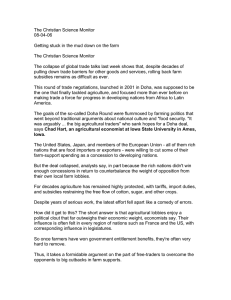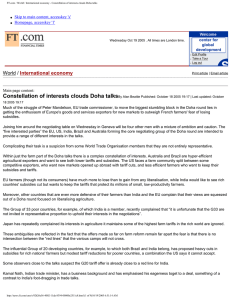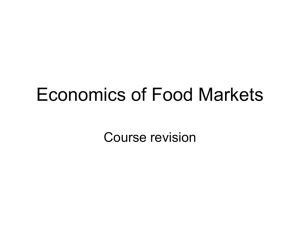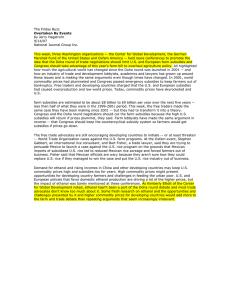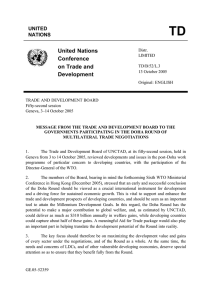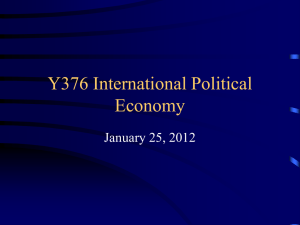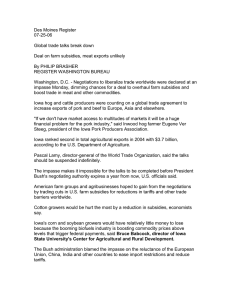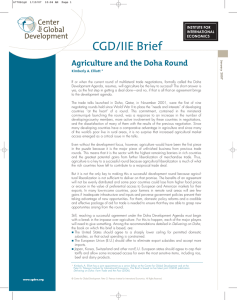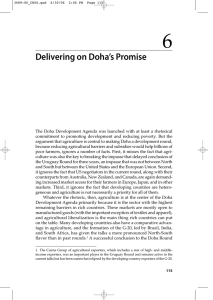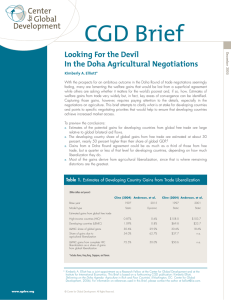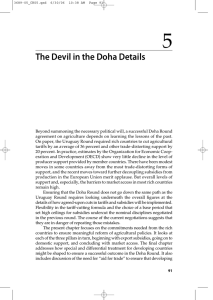The Christian Science Monitor 07-27-06 How farms stymied Doha
advertisement
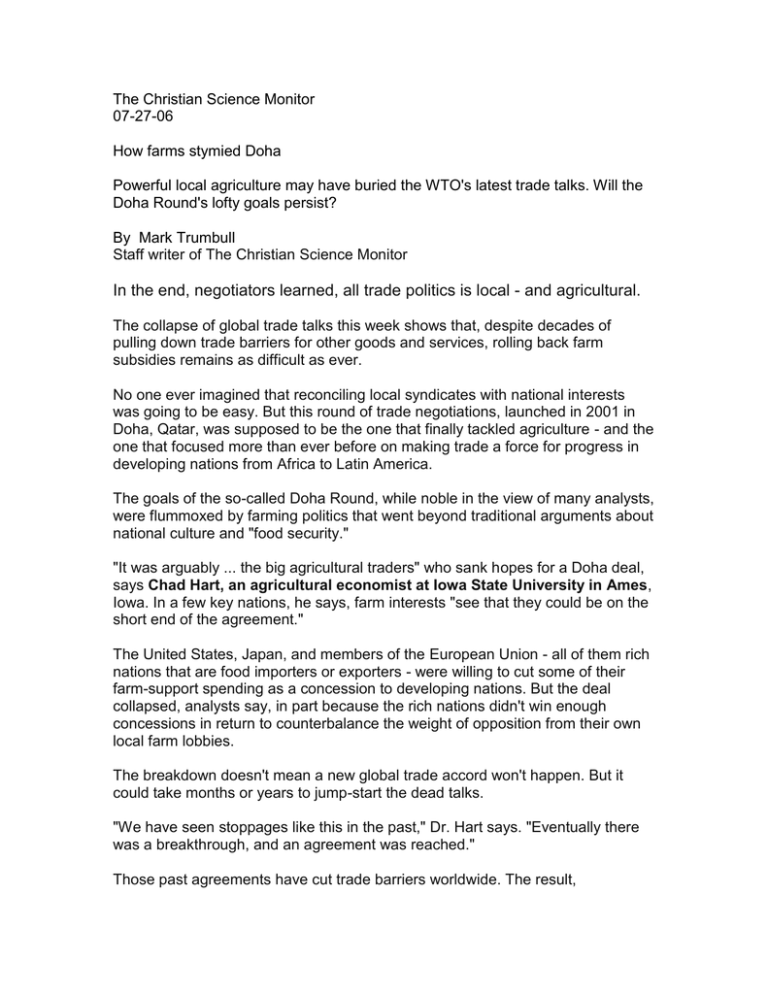
The Christian Science Monitor 07-27-06 How farms stymied Doha Powerful local agriculture may have buried the WTO's latest trade talks. Will the Doha Round's lofty goals persist? By Mark Trumbull Staff writer of The Christian Science Monitor In the end, negotiators learned, all trade politics is local - and agricultural. The collapse of global trade talks this week shows that, despite decades of pulling down trade barriers for other goods and services, rolling back farm subsidies remains as difficult as ever. No one ever imagined that reconciling local syndicates with national interests was going to be easy. But this round of trade negotiations, launched in 2001 in Doha, Qatar, was supposed to be the one that finally tackled agriculture - and the one that focused more than ever before on making trade a force for progress in developing nations from Africa to Latin America. The goals of the so-called Doha Round, while noble in the view of many analysts, were flummoxed by farming politics that went beyond traditional arguments about national culture and "food security." "It was arguably ... the big agricultural traders" who sank hopes for a Doha deal, says Chad Hart, an agricultural economist at Iowa State University in Ames, Iowa. In a few key nations, he says, farm interests "see that they could be on the short end of the agreement." The United States, Japan, and members of the European Union - all of them rich nations that are food importers or exporters - were willing to cut some of their farm-support spending as a concession to developing nations. But the deal collapsed, analysts say, in part because the rich nations didn't win enough concessions in return to counterbalance the weight of opposition from their own local farm lobbies. The breakdown doesn't mean a new global trade accord won't happen. But it could take months or years to jump-start the dead talks. "We have seen stoppages like this in the past," Dr. Hart says. "Eventually there was a breakthrough, and an agreement was reached." Those past agreements have cut trade barriers worldwide. The result, economists say, has been new commercial activity that has added several trillion dollars to the world economy in the past few decades. But throughout it all, agriculture has remained highly protected, with tariffs, import duties, and subsidies restraining the free flow of cotton, sugar, and other crops. With so many areas of trade already liberalized, the Doha Round could hardly avoid putting farm goods at the forefront when talks began in 2001. But despite years of serious work, the effort fell apart like a comedy of errors. The US and European Union are now trading jabs at each other for not offering deep enough cuts in farm protections. India refused to stop shielding its farmers from global competition. And the agriculture minister for Japan, which has long protected its rice farming industry - complained that "I was not given the opportunity to show all of my cards" in negotiations. How did it get to this? The short answer is that agricultural lobbies enjoy a political clout that far outweighs their economic weight, economists say. Their influence is often felt in every region of nations such as France and the US, with corresponding influence in legislatures. So once farmers have won government entitlement benefits, they're often very hard to remove. "You take that cotton land down in Mississippi.... That land would probably drop in value by half" without subsidies, says Gary Hufbauer, a trade specialist at the Institute for International Economics in Washington. Thus, it takes a formidable argument on the part of free-traders to overcome the opponents to big cutbacks in farm supports. Similarly, developing nations such as India and China often have their own political resistance to free trade in farm goods. The concern, Dr. Hufbauer says, is that "if the liberalization is too fast, too many rural people will leave the farm life too quickly ... and disrupt the political system." For the Doha Round, these obstacles proved too great, dashing for now the hopes of nations from Brazil to West Africa that foresee significant gains from freer farm trade. More broadly, though, most economists say that all nations stand to benefit from more open trade. A World Bank study eight months ago estimated that the abolition of tariffs, subsidies, and domestic support programs would add $300 billion a year to the global economy by 2015. Nearly two-thirds of the gains would come from farm reforms, since that's the sector most distorted by current government policies. But the more limited the scope of reform, the smaller the gains. It matters a lot, for example, whether a deal removes tariffs on imports as well as subsidies for exports. "Deep reductions in agricultural tariffs would deliver 12 times the gains that would be achieved by abolishing export subsidies and trade- distorting domestic support to agriculture," Will Martin, a World Bank economist, said when the study was released. In the Doha Round, the niggling over details blocked substantial changes. Antoine Bouet, an economist at the International Food Policy Research Institute in Washington, says that if the talks restart, one answer could be a three-way compromise. The goal would be for the US to cut more domestic supports, the EU to cut more import duties, and the G20 nations (which include China and India) to cut more industrial tariffs. All would benefit together, he says, but the costs for some sectors would be significant. American sugar producers and fruit growers, for example, would no longer be as competitive against imported goods. For those within any nation who lose from free-trade deals, the change can be hard. And while trade promises significant gains, it is not a simple recipe for development in Africa or elsewhere, Bouet says. Trade can help transform economies, by fostering new industry and the transfer of technology. But he says the most important development policies for any nation are domestic, starting with basic elements such as the rule of law and secure property rights. "The decisive reform," Dr. Bouet says, is "political stability and creation of good institutions."
